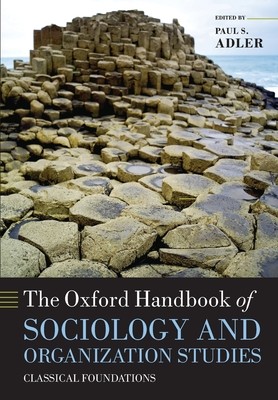
- Išsiųsime per 10–14 d.d.
- Leidėjas: Oxford University Press, USA
- ISBN-10: 0199593817
- ISBN-13: 9780199593811
- Formatas: 17 x 24.4 x 3.6 cm, minkšti viršeliai
- Kalba: Anglų
- Extra -15 % nuolaida šiai knygai su kodu: ENG15
The Oxford Handbook of Sociology and Organization Studies (el. knyga) (skaityta knyga) | knygos.lt
Atsiliepimai
Aprašymas
Organizations are a defining feature of the modern world, and the study of organizations (Organization Studies) has become well established in both sociology departments and professional schools, most notably business and management schools.
Organization Studies has long drawn inspiration from foundational work in sociology. The sociological lens affords depth of insight into the technological, economic, cultural, and political forces that shape organizations from both within and without. In particular, "classical" works in sociology have long energized organizational research, primarily by suggesting ways of making sense of the ever-accelerating pace of social change. In recent decades, however, the field has lost interest in these sociology classics. This trend reflects and reinforces an increasingly academic focus of contempory Organization Studies. Not only does this trend weaken Organization Studies' engagement with the big social issues of our time, but it isolates the field from the broader field of the social sciences. The aim of this Handbook is to re-assert the importance of classical sociology to the future of Organization Studies. Alongside several thematic chapters, the volume includes chapters on each of nearly two dozen major European and American theorists, each of these chapter addressing: (a) the ideas and their context, (b) the impact of these ideas on the field of Organization Studies, and (c) the potential future research these ideas might inspire. The goal is not reverential exegesis, but rather to examine how the classics can energize organizational research. This wide-ranging Handbook, with contributions from leading American and European scholars, will be a vital, informative, and stimulating resource for anybody undertaking research in, teaching, or interested in learning more about Organization Studies today. About the SeriesOxford Handbooks in Business & Management bring together the world's leading scholars on the subject to discuss current research and the latest thinking in a range of interrelated topics including Strategy, Organizational Behavior, Public Management, International Business, and many others. Containing completely new essays with extensive referencing to further reading and key ideas, the volumes, in hardback or paperback, serve as both a thorough introduction to a topic and a useful desk reference for scholars and advanced students alike.
EXTRA 15 % nuolaida su kodu: ENG15
Akcija baigiasi už 18:48:50
Nuolaidos kodas galioja perkant nuo 10 €. Nuolaidos nesumuojamos.

- Leidėjas: Oxford University Press, USA
- ISBN-10: 0199593817
- ISBN-13: 9780199593811
- Formatas: 17 x 24.4 x 3.6 cm, minkšti viršeliai
- Kalba: Anglų Anglų
Organizations are a defining feature of the modern world, and the study of organizations (Organization Studies) has become well established in both sociology departments and professional schools, most notably business and management schools.
Organization Studies has long drawn inspiration from foundational work in sociology. The sociological lens affords depth of insight into the technological, economic, cultural, and political forces that shape organizations from both within and without. In particular, "classical" works in sociology have long energized organizational research, primarily by suggesting ways of making sense of the ever-accelerating pace of social change. In recent decades, however, the field has lost interest in these sociology classics. This trend reflects and reinforces an increasingly academic focus of contempory Organization Studies. Not only does this trend weaken Organization Studies' engagement with the big social issues of our time, but it isolates the field from the broader field of the social sciences. The aim of this Handbook is to re-assert the importance of classical sociology to the future of Organization Studies. Alongside several thematic chapters, the volume includes chapters on each of nearly two dozen major European and American theorists, each of these chapter addressing: (a) the ideas and their context, (b) the impact of these ideas on the field of Organization Studies, and (c) the potential future research these ideas might inspire. The goal is not reverential exegesis, but rather to examine how the classics can energize organizational research. This wide-ranging Handbook, with contributions from leading American and European scholars, will be a vital, informative, and stimulating resource for anybody undertaking research in, teaching, or interested in learning more about Organization Studies today. About the SeriesOxford Handbooks in Business & Management bring together the world's leading scholars on the subject to discuss current research and the latest thinking in a range of interrelated topics including Strategy, Organizational Behavior, Public Management, International Business, and many others. Containing completely new essays with extensive referencing to further reading and key ideas, the volumes, in hardback or paperback, serve as both a thorough introduction to a topic and a useful desk reference for scholars and advanced students alike.


Atsiliepimai